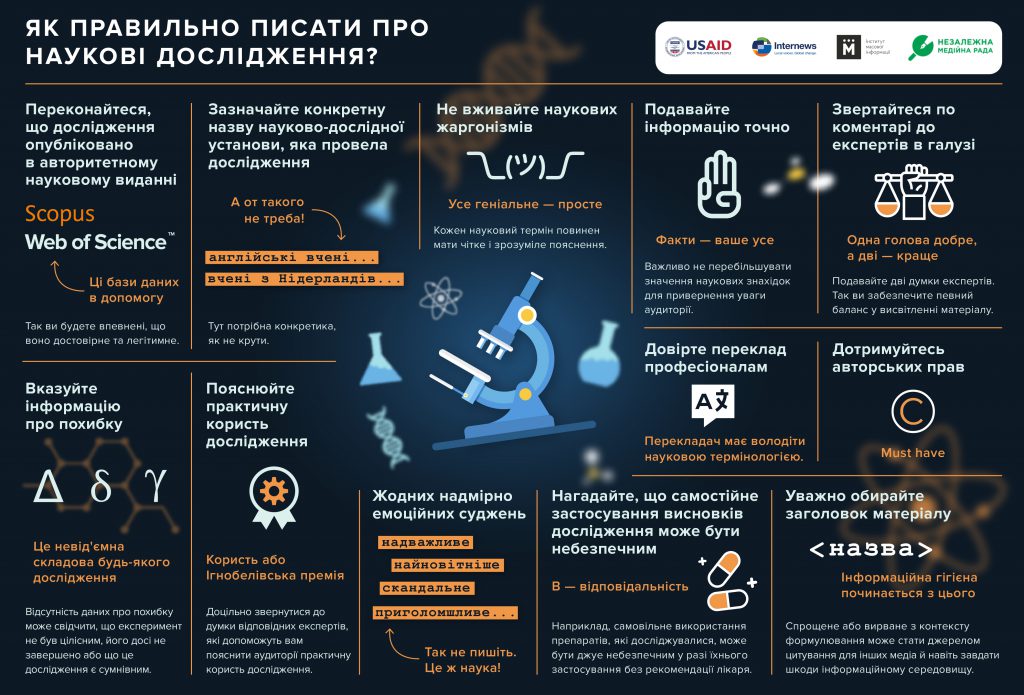In a developed democratic society, the media play an important role. In addition to their principal – informational – function, they ought to increase the audience’s knowledge level. The media’s educational function is just as important as the informational function. In his Journalism and Media Handbook, Siegfried Weischenberg described the educational function as follows: “Conveying knowledge to the public enables them to adequately assess and organize information obtained from different sources, as well as navigate the contradictory flow of information.”This becomes especially relevant in the era of social networks’ development that are often a source of false and manipulative information.
One of the elements of educational journalism is covering scientific research studies.
Such materials have significantly increased in number with onset of the coronavirus pandemic. According to the Institute of Mass Information, 8% of all media materials about the pandemic were dedicated to COVID-19 research.
However, it should be noted that sometimes publications regarding anti-virus drug efficacy studies were written in a non-constructive way potentially encouraging people to self-medicate.

The Independent Media Council has prepared recommendations on covering scientific research studies.
1. Before writing a piece about a research study, make sure that the latter was published in a leading peer reviewed journal. That way, you will be sure that it is a reliable and legitimate study. Peer reviewed publications (journals) can be found in the Scopus or Web of Science databases. The better the journal, the higher the citation rating, based on which the IF (impact factor) is calculated.
2. Be sure to include the name of the research institution that conducted the study. Do not use general phrases such as “British scholars”, “scholars from the Netherlands”, etc.
3. Do not use scientific jargon or overload the text with incomprehensible terminology. Remember that every scientific term needs to be clearly and intelligibly explained to the audience.
4. Deliver accurate information. Journalists and the media should not exaggerate the importance of scientific findings to attract the audience’s attention. At the same time, you can make assumptions about the outcomes of a study. However, your comments or assumptions have to be clearly separated from the facts, and the audience should understand that this is only your opinion.
5. It is advisable to seek comment from experts in the field you are writing about. It could be provided by a study’s author or another researcher to help you critically evaluate the study. By providing two expert opinions, you will ensure a balance in covering the topic.
6. The vast majority of research studies contain information about the error margin or factors that may negatively affect the accuracy of the results. When preparing a publication, you should always indicate the margin of error or mention those negative factors. If the study you are writing about does not mention such a margin, it calls into question the validity of its findings. The lack of data on the margin of error may indicate that an experiment was not comprehensive, is incomplete, or that this study is questionable.
7. Use a constructive approach: explain to the audience the consequences of a study in terms of practical applications, and what difference it can make. Maybe, it will not suffice to rely just on your own conclusions, and it will be more appropriate to seek the opinions of experts in the field.
8. Do not use emotionally charged value judgments and epithets such as “of paramount importance”, “latest,””scandalous,””stunning,” etc. Do not overestimate or undermine the importance of a study either.
9. Be sure to remind the audience that their use of the elements or findings of a study could be dangerous, and that the study itself is not a substitute for seeking professional medical advice in case of illness. For example, unauthorized use of drugs whose efficacy in treating certain diseases was studied can be extremely dangerous if used without a doctor’s recommendation.
10. If you order a translation from a foreign language, it should be made by a translator familiar with the terminology used in a given scientific field.
11. Make sure that you do not infringe copyright when publishing, translating and/or reprinting a study.
12. Be extremely cautious when choosing the title for your material, because a simplified or incorrectly generalized title could distort and even downplay the important essence of a study, while such out-of-context description could be a citation source for other media or even do harm to the information environment by intensifying the disinfodemic.



